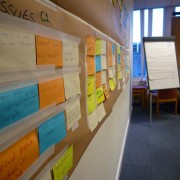For improving customer experiences I’d rather have Right Data than Big Data
On my first day of my first proper job in the UK they called me “New York”. Not because I was energetic, intriguing or that I never slept but because, when it took me a while to understand what was apparently an hilarious corporate joke, I was – in their words – “five hours behind”.
And many (very many) years later, so it seemed with my understanding of what has been given the label of Big Data. I see it written about everywhere, something that self-proclaimed experts talk of as the latest critical key to a sustainable business. However, I seemed to have missed the briefing about what exactly it was and why it was apparently so vital to our future existence. The cynic in me was muttering about new clothes and Emperors but also part of me didn’t want to miss out, just in case…
Recently then, I was looking forward to catching up with the rest of the world and be able to converse like an insider when it comes to the subject of big data. Within the space of a week, I had the privilege of chairing a retail analytics event in London and speaking at a conference in Barcelona on creating efficient airports through a focus on customer experience.
What was clear from both is an insatiable appetite for more data. What is less clear is whether the ability to capture and analyse more and more information is generating the contextual knowledge that businesses need to bring about the change their own business plans demand.
Never before have we had this amount of information available at our fingertips. True, it means that where once we relied on modelling and forecasting from a small amount of transactional data, we can now reduce the risk by removing the need for so many assumptions. But does that automatically mean we have the right knowledge to support our business and customer strategy?
For airports, efficiency is everything but that can come dangerously close to putting passengers’ real needs in the blind spot. Research I’ve carried out shows that customers in an airport put cleanliness, friendly staff and clear signage at the top of the list of the things they value. And yet, they rarely make it to the Exec team’s dashboard. People do have a choice and they do go to the next airport if their expectations is one of an experience they are no longer prepared to tolerate.
It is unfair to single out airports; many organisations in many markets become (admittedly sometimes unintentionally) very metric-led. Balanced scorecards thrive on them but it easily drives the wrong behaviours. Vendors at the airport conference proclaimed that their products offer – and I quote – “first-class passenger processing”. There was a sense that if it moves it can be processed, if it can be processed we can bar-code and measure it and if it can be measured we can create more metrics to grow our pile of data.
Take, for example, the “How was it for you?” array of good / ok / bad buttons having just gone through airport security. It’s data in the making but on its own, apart from regulatory reporting, for what real purpose? If 100% of people hit the red “It was bad” button, how can the airport know what to do differently without any supporting qualitative information? Depending on how you look at it, while this piece of data adds to the big picture, it is either a costly activity with little return or a missed opportunity as the infrastructure is there anyway.
In the retail world, the amount of transactional information is certainly impressive. One Turkish supermarket chain had made a huge success of it. What is worrying though, is the apparent disconnect between all this data and business improvement. When I asked the retail analytics delegates what value their work adds to the business, there were puzzled looks and absolute silence. Slightly surprised, I then asked how they would respond if their CEO asked how the data they present helps achieve the business plan. Eyes down, awkward shuffling and more silence.
Does this mean that in our relentless surge to generate bigger and bigger data because we can, not only are we making it more difficult to sift out the right information but that we’re losing sight of why we’re collecting any information in the first place?
A piece of research just released talked about the gap between companies’ intended customer experience programme and their lack of effective implementation. One reason may be that the quest to understand everything about everything and to amass oceans of data has overshadowed the importance of having the skills to find the right information and how to be organised to then do something about it.
There was another corporate saying that took me a while to understand. It was the one about “Don’t boil the ocean”. We couldn’t anyway back then but metaphorically, maybe now we can.
That said, just because we can, still doesn’t mean we should.


Leave a Reply
Want to join the discussion?Feel free to contribute!